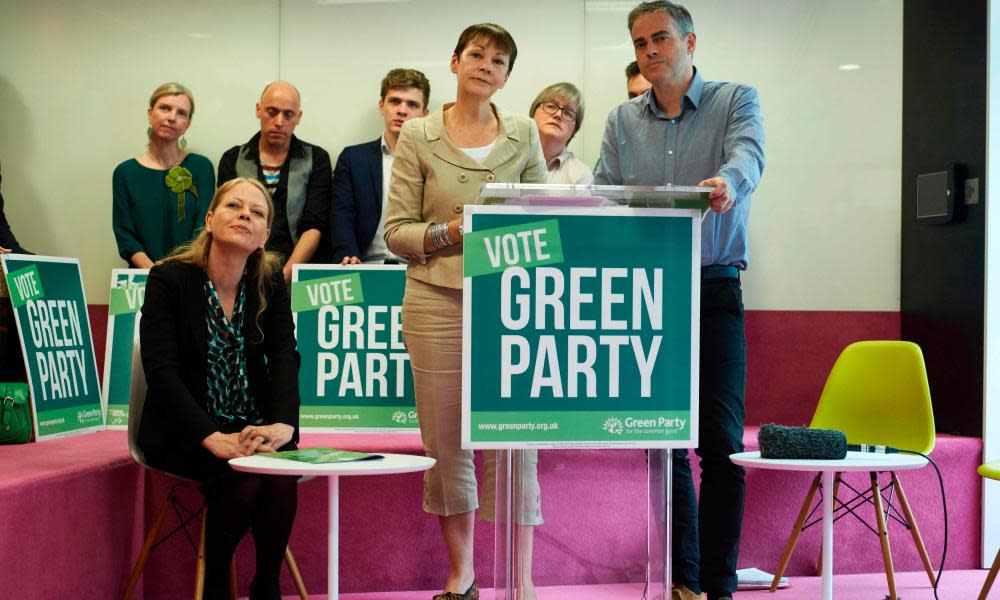In a difficult week, the Green party shows that all you need is love | John Crace

Monday
I almost didn’t make it to the launch of the Green party manifesto because, after negotiating a futuristic lift that seemed to decide my destination for me, I was tipped out on to the fourth floor of a swanky Soho office building and expected to negotiate a narrow walkway with a 50ft (15 metre) drop on either side. Not good for someone who suffers from vertigo. But after giving myself a stern talking to, I made it across and was glad I did. The launch couldn’t have been more different from those of the Conservatives and Labour. It took place in a tiny meeting space – the beanbags (this was Soho) had been stacked up by the window – that could only hold 10 Green activists along with the co-leaders, Caroline Lucas and Jonathan Bartley, and was relaxed and informal. Lucas spoke of “living in, learning from and loving the other 27 EU members”. She is the first politician I have heard use the word love throughout this election campaign. I may be going soft, but if I lived in the Brighton Pavilion constituency, I could vote for love.
Tuesday
One of the points of Ariana Grande is that people such as me shouldn’t have heard of her. She represents a rung on the transition towards adulthood, a symbol to young girls that they have lives and identities separate from their parents. My daughter has long since climbed that ladder, but I still remember taking her to a recording of a Saturday morning live TV show at which her favourite band, Steps, were miming to their latest hit. I found the whole thing excruciating – not the music, but watching my daughter wanting to dance with the other girls in the audience but being too shy and standing on her own near the back. A Kylie gig in Hammersmith some years later was far more successful, as my daughter stood on her seat and danced along along with hundreds of other teenage girls and almost as many gay men. It wasn’t such a good night for her younger brother, who had insisted he didn’t want to be left at home. After about half an hour, he curled up on the floor and went to sleep.
Wednesday
The Japanese island of Gunkanjima, near the coast of Nagasaki, was the world’s most densely inhabited place in the 1950s, with almost 6,000 people working in a single coal mine crammed on to a piece of rock measuring less than 1 sq km. Once the coal ran out and Mitsubishi closed the mine, everyone left and the island, known to locals as Midori nashi Shima (island without green), became a ghost town. Not any more. Although there is still no one living there and many of the concrete buildings have long since become rubble, there are signs of life. Bits of greenery that hadn’t seen the light of day for well over half a century have started to appear. Grass grows through the cracks and shrubs and trees have also managed to take root, having either lain dormant or been blown in by the wind. Two years ago, Gunkanjima was declared a Unesco world heritage site. At times such as these, it is good to remember that renewal is possible.
Thursday
Ever since my father died after failing to come round from a heart operation in 1999, I have read everything I can get my hands on about cardiac surgery. In part as a guilty pleasure, but also, if the genetics play out, as a window into my own mortality. This year, there have been particularly rich pickings. First was Stephen Westaby’s Fragile Lives, a heart surgeon’s candid account of the operations that defined his career, ones that went well and others that ended badly, and the patients he has been unable to forget. It made for a compelling read, if not always an easy one. Rather more upbeat, though equally gripping, was Thomas Morris’s The Matter of the Heart – A History of the Heart in Eleven Operations, which details the breathtaking advances that have been made in the past 100 years. Some conditions that were invariably fatal can now sometimes be treated as day cases. Often it has been a trial and error, numbers game, dependent on the brilliance and arrogance of a single surgeon. It’s possible even that my Dad died so I may not have to. No son could ask for more.
Friday
Politicians are often accused of lacking vision, but two readers have drawn my attention to the Ukip candidate Aidan Powlesland, who is standing in the South Suffolk constituency. Under the heading the Starry Firmament on his campaign leaflet, Powlesland calls for a “£40m interstellar, nano-probe fleet design (potential customer Yuri Milner)”, £60m to be spent on an “interstellar diasporanet” – me neither – £100m to fund an interstellar colony ship and £1bn for “the first company that can, by 2026, profitably mine the asteroid belt, Jovian or Saturnian moons for platinum and water”. I’m not sure whether these are official Ukip policy – although they are no weirder than some of the stuff in its manifesto – but no one can accuse the party of lacking blue skies thinking. Or even deep skies thinking.

Digested week: Manchester

 Yahoo News
Yahoo News 
